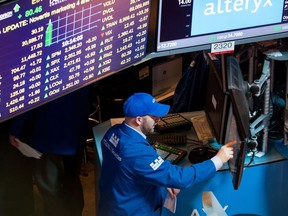Article content
Credit bulls are pointing at a set of metrics to show that high-grade bonds have rarely been this cheap, burnishing the appeal of corporate debt at a time when it’s offering little upside over government securities.
A comparison of high-grade U.S. debt and the S&P 500 shows that credit is trading at the biggest value gap with equities in more than 20 years, according to data compiled by Bloomberg. For Europe, the same measure goes back at least a decade.
Article content
The trend is breathing new life into the conviction of credit investors such as Morgan Stanley Wealth Management and Tikehau Capital SCA, which are contending with risk premiums nearing post-crisis lows over sovereigns. Bonds may now offer a more compelling case for exposure to companies, especially after a relentless rally in stocks since the end of last year, they say.
Article content
“For the first time in years, you are now getting paid to be invested in quality credit,” Raphael Thuin, head of capital market strategies at Tikehau Capital, said. It’s “a true alternative to lower-yielding equities, trading at or close to all-time highs.”
The 12-month returns from investment-grade credit could “rival those of equities” on a risk-adjusted basis, Morgan Stanley chief investment officer Lisa Shalett said in a note earlier this week.
Stock valuations have skyrocketed since the onset of a near 30 per cent rally in the S&P 500 in the final months of 2023, while bonds have been hamstrung by expectations that the United States Federal Reserve will keep interest rates higher for longer.
Article content
While bond yields are a reliable indicator of what investors would earn over the next 12 months if they held a note to maturity, investors use earnings yields as a value measure for equities by dividing the previous year’s profit with the stock price.
These yields have been diminishing as stock prices rise at a faster pace than earnings. The earnings yield on the S&P 500 is now almost two percentage points below the average bond returns for BBB-rated firms, the weakest-rated segment of the high-grade market that Morgan Stanley focuses on.
While credit is already offering good value, its appeal would be enhanced further by future policy easing, according to Shalett.
“With investment-grade likely to benefit from Fed rate cuts by next year, we prefer owning coupons,” she said.
To be sure, other parts of the bond market are offering even better value than corporate debt.
“If the only option you have is investment-grade corporate bonds and stocks, then I understand that argument,” said Gene Tannuzzo, global head of fixed income at Columbia Threadneedle Investments, who argues that Treasuries are even cheaper than equities by the same metric.
Article content
“The truth is that the ‘cheapness’ of IG bonds in that measure comes from elevated treasury yields, not the risk premium,” he said.
While spreads have tightened, investment-grade credit, especially in Europe, remains attractive enough to investors searching for yields around four per cent, according to Fabrizio Viola, portfolio manager at Assicurazioni Generali SPA.
Tikehau’s Thuin said the value of corporate debt now lies in yields rather than the spreads with government bonds.
“The asset class is now more driven by interest rate oscillations than spread compression,” he said. “They compare well to equity earning yields.”
With assistance from Cecile Gutscher.
Bloomberg.com
Share this article in your social network



